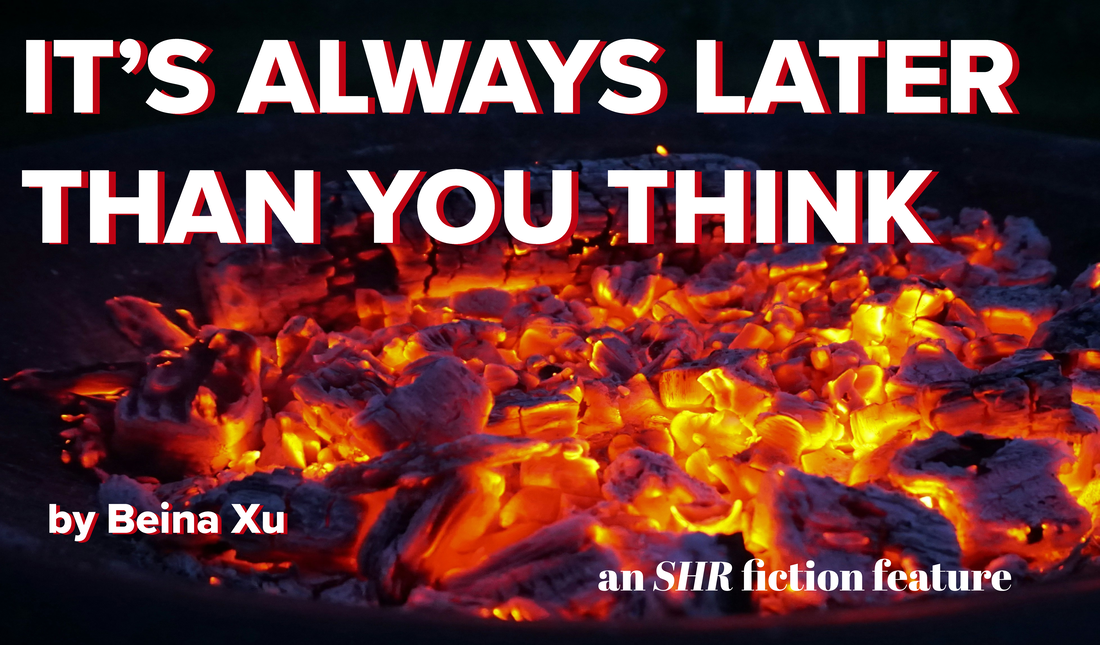“Why do you do that?” her partner asked. She cleared her throat.
“Feels nice.”
He shrugged and went back to his work. He was a thermal engineer who researched energy distribution in single-family homes.
She couldn’t explain it. It was perhaps her only need that was satiable. As a child, she severed wasps and bludgeoned stink bugs to death. Just the other day, she crushed an ant. It was by her leg, next to the river where she’d been sitting, crying. It hadn’t bothered her; she hadn’t even seen it until she noticed her own body. She hesitated, staring it down through seasick eyes. The thought occurred to her that she could just kill it. It wouldn’t matter a bit. But it didn’t seem right—the ant hadn’t done anything. She felt ashamed. Then the shame lifted, quick as a mood. Her mind went gray, and slowly she lifted a birch stick and dug its point into the ant’s thorax.
Later she realized she liked that feeling—of not knowing why you had done something, but that you simply could.
Her child, six, cried a lot. She was sweet but cloying, and at least a few times a week, Leo regretted having a kid. Her partner admonished her for admitting so, but he didn’t act like he felt any differently. Leo fried her sausages every day after school. She bought mini ones that looked like children’s fingers. Sometimes she scored them with a knife so her daughter could see a row of gashes on the plate. Sometimes she didn’t. That way, the sausages could whine and explode under the pressure of her hand, and her daughter could see that you could always do things differently.
One day, the girl came home crying.
“Mama, mama,” she wailed. Leo squatted to her level.
“What’s going on?” Leo was irritated. She was in the middle of her work.
“Ms. Waldorf gave me a time-out,” her daughter sobbed with dramatic effort.
Ms. Waldorf was a teacher at her daughter’s school. She was the age of Leo’s estranged mother and voted the same way. Her son had been a marine.
“Why did she give you a time-out?” Leo asked.
“Because,” the girl sniffed, and then she grew quiet. Leo went to put the pan on the stove and placed two small sausages in the center. Then she made herself a cup of tea. Sometimes the story needed time to come out. It was often this way with children and adults. Her daughter looked at the floor until the water screamed in the kettle.
“I killed something,” she finally said.
Leo put down her mug. It made a sharp sound, like something snapping free.
“What was it?”
The girl was silent. She stared at her feet and began to chew her nails. She wasn’t going to tell her—Leo already knew that much. She picked her mug back up.
“What did Ms. Waldorf say?” she ventured, looking for honey. At this, her daughter became more animated and swayed from foot to foot, as if relieved at the opportunity to finally tell the truth.
“That I must have a terrible mother,” she blurted happily.
Leo found the honey and dipped a large spoon inside. When she brought it back up, she saw that it had congealed into a salt-like mass. It was no longer thick and viscous but had changed properties completely. Without tasting it, she plunged the spoon into her cup and stirred vigorously until it disappeared.
“You tell Ms. Waldorf,” she said to the girl, who was swallowing bits of her own fingernail, “that a mother loves all creatures.”
Leo crouched down with her cup of tea. She looked at her daughter straight. There was nothing that resembled her, as far as she could see. Sometimes people didn’t even know she was her mother. She was happy about that. She wanted to keep it that way. It gave her back the margin she had taken away from herself.
As for the dead-whatever, it was a pity. Her daughter was six. Ms. Waldorf’s son was twenty-three when he was shot on a tour overseas. There was just one thing Leo wanted to know.
“Tell me something, sweetheart,” she began. She flicked the hair from her daughter’s face. The girl had copper irises, like the tip of a Roman spear. Above them, the sausages began to hiss in the pan.
“Did you feel free?”
CURRENT ISSUE
|
CONTACT
|
DEPARTMENT OF ENGLISH
|


